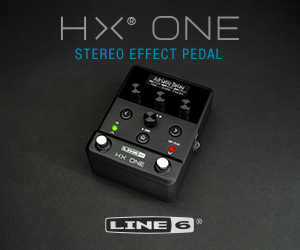How Investing In Your Gear and Yourself Can Save The World
trushack | Aug 07, 2016 | Comments 2
How Investing In Your Gear and Yourself Can Save The World
A Perspective on Cause and Effect in the World of Guitars
Do you remember the scene in Good Will Hunting, the interview scene where Matt Damon was answering the question “Why shouldn’t I work for the NSA?” If you don’t, or haven’t even watched it, take a quick break and go check it out :
https://www.youtube.com/watch?v=UrOZllbNarw
So, what does that have to do with gear? Well, everything has cause and effect. Much like cracking a code can have an effect on a distant community somewhere on earth, our buying decisions have direct impact on the music industry.
So, please humor my extremely poor Matt Damon imitation for a moment.
Although we may not be saving the world from global warming or terrible pop music, let’s talk about how your buying decisions shape the gear industry.
I think we can all agree, that the last place a great piece of gear deserves to be is stuck on a shelf or hanger somewhere, sitting unused. We hear this criticism lobbed occasionally at collector; a fine vintage instrument sells for a couple of mortgage payments (maybe even the price of a house itself), only to spend the rest of it’s life sitting in a case. But the same can be true, in a different sort of context, with modern instruments and the follow-on consequences can be even more dire.
Part of the conundrum is that the good stuff isn’t moving as much as it should be. Why? Well, among the multitude of factors is the holdout for something extra to entice us. A free case, a year’s worth of strings, a coupon for X% off; just owning a quality instrument isn’t enough, sometimes. We need that teaser to get us to pull the trigger.
Hey, it’s a competitive marketplace, right? And incentives are all part of competing, no? All true. A buying decision is an intensely personal thing, and we all rely on any number of unique factors to ultimately decided on when and if to pull the trigger. But we here at TheToneKing.com think it’s worth adding this bit of information below to your decision chain.
The longer a piece of gear sits on a retailer’s shelf, the more money they lose on it. Every time a retailer brings in a new product for sale, he is making an investment from which a reasonable return is expected. Not only does he need to recapture his own outlay, he needs to make enough profit to cover his overhead costs (rent, wages, etc) and hopefully make a little bit extra on top.
And if things are flying off the shelf, great. He can continue to reorder, giving other folks like the manufacturer and perhaps a distributor, continuing business, and hopefully use the profits accrued over time to hire more staff, expand his business, or both.
For general illustrative purposes, let’s consider a plucky shopkeeper and his modest guitar store. Let’s say he carries all the basics: electrics, acoustics, bass guitars, even the odd banjo or mandolin, and strings, picks, and the like. Nice stuff, not junk at all. Now let’s say, for whatever reason, he moves twice as many acoustic guitars as he does electric guitars in a given month. At times, he can barely keep the things in stock, whereas an electric guitar sits in stock longer.
In all likelihood, this shopkeeper is going to, over time, shift his inventory towards acoustics and away from electrics. But to do that, he needs to get those unsold electrics out the door to make room for a larger acoustic inventory. So how is he going to do that? He has to begin throwing incentives for those electric guitars out there.
So you may be thinking, “OK, the retailer will still make a sale, and someone will still get a piece of gear he might not have otherwise been able to afford or more value for my money in the form of some add-ons. Putting things on sale ain’t nuthin’ new. What’s the problem?”
While the shopkeeper is certainly glad to get the business and we musicians are certainly glad to save a few bucks on a cool electric, the retailer is less motivated to carry stuff that requires extra incentives just to get out the door.
The Manufacturer:
This creates a lot of difficulties for the manufacturers, particularly those attempting to maintain a spot in a very crowded market. The electric guitar manufacturers want to entice our shopkeeper to continue to carry their products. But if the only way a retailer can move a particular item is to put it on sale or throw in extras, he’s going to give the manufacturer less for his product or stop ordering it altogether. While a lot of larger manufacturers are pretty well insulated from these issues for a variety of reasons (name recognition alone is huge), the smaller and mid-sized ones are not.
Back to our shopkeeper:
So acoustics are becoming the shop’s bread and butter, while the electric guitar sales are treading water at best. The shopkeeper may go a couple of different ways here. He may decide to order less of a product. He may decide to negotiate a lower price with manufacturer. He may decide to stop ordering the item altogether. The results in each scenario ain’t pretty; if the manufacturer lowers his wholesale price or is faced with reduced orders from the retailers, he gets less return on his investment, which means fewer orders for his suppliers and less opportunity to grow. Of course, if orders dry up altogether that can be a painful hit to a manufacturers (and his suppliers) in ways you can probably imagine.
Now on to us, the players:
And that hit trickles down. The players simply lose out on another great source of gear. The variety and innovation we’ve come to expect from today’s gear marketplace gets set back.
The variety and innovation we’ve come to expect from today’s gear marketplace gets set back. That means, for example, you just won’t see all four sizes of ukuleles (soprano, concert, tenor, and baritone) sitting on the shelves at the same time anymore. The editor of TheBestCoverEver.com says that instead of having a wide selection to choose from you will mostly see more and more of the best selling instruments and industry favorites and less of everything else.
Now here’s where you can make a difference: go out and get that guitar, that amp, that pedal now. Yes, killer deals are awesome, and we shouldn’t pretend that we’re going to pay full price for every single piece of gear we buy from here on out. Nor are they always a detriment for shops or manufacturers.
But instead of trying to wait out the market until the last possible second and save as many shiny nickels as possible, help out some of those manufacturers that are producing quality gear but lack visibility and buy their stuff. This gets retailers excited about carrying their products, enables the manufacturer to buy and produce in quantities that let them take advantage of purchasing in bulk from suppliers (helping lower the price), and gives musicians much more selection.
We here at TheToneKing.com, we get to talk to all sorts of impressive folks in the gear business, including manufacturers, distributors, retailers and YOU, the players. We strive to give you knowledge, and hope this article sheds some light on cause and effect in the music industry. Share with us your feedback. Did we hit the mark? What do you think of the above?

Tiny URL for this post:
Filed Under: Featured • Commentary / Editorials
About the Author:




















